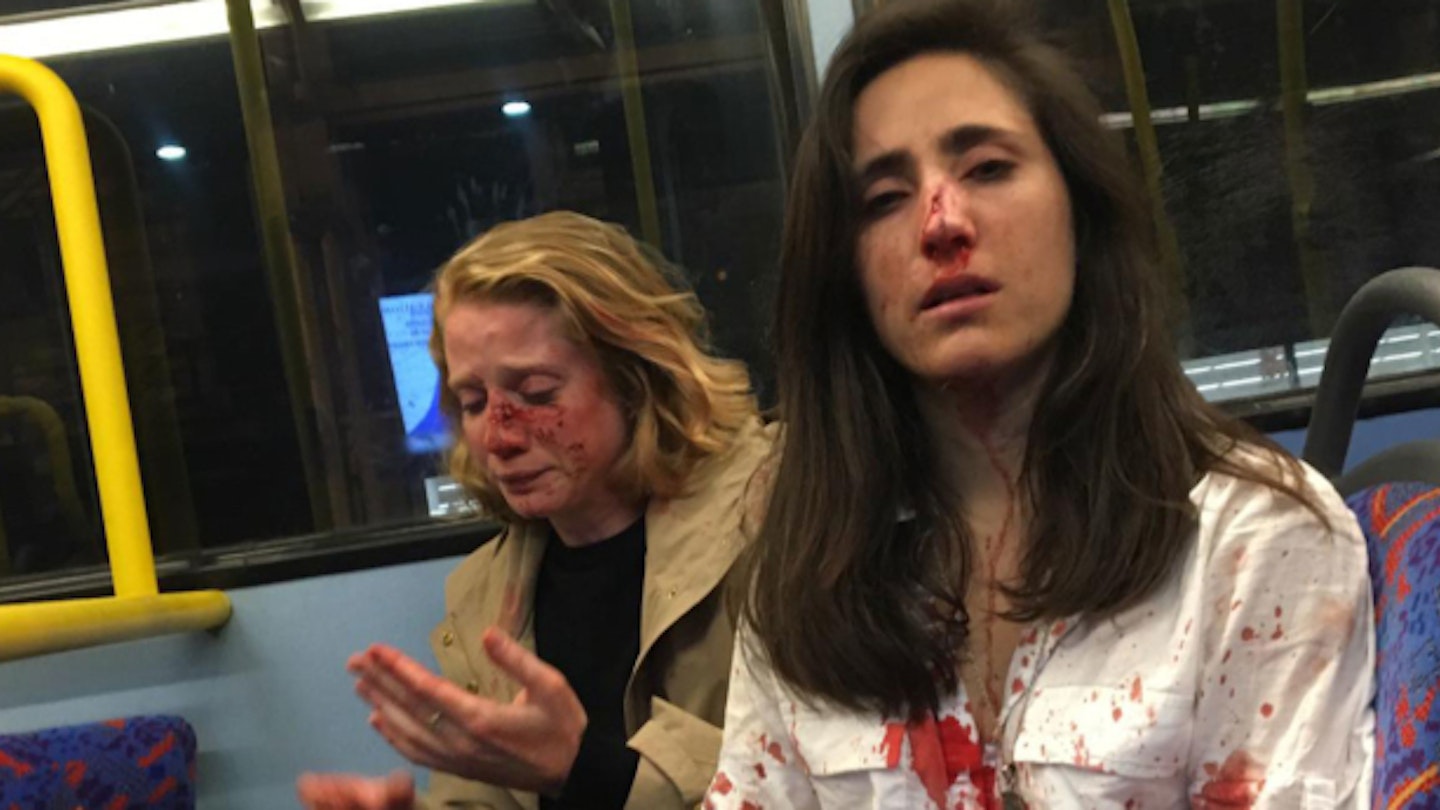UPDATE: Following a homophobic attack on two women in London, two 17-year-olds, a 16-year-old and a 15-year-old have denied harassing and violent attacking the victims. All four are charged with using threatening, abusive, or insulting words or behaviour to cause harassment, alarm, or distress, and will stand trial on the 28th of November.
Back in June when this story originally broke, Eli Goldstone wrote:
All day, photographs having been circulating of two women who were the victims of a homophobic assault on a night bus in Camden. The photograph makes you stop: it is bloody and the faces of these women are exhausted and bewildered and sad. People have been responding with shock and outrage, while swathes of queer women have been sharing their own experiences. We too are sad, but we are not surprised. It is jarring to see a picture of the violence that we have experienced on our own bodies, repeatedly, taken to its logical conclusion. Every queer person I know looks at that photo and thinks But why should it take blood to make people take notice?
Melania Geymonat and her girlfriend Chris were traveling to Camden Town on a bus last night when a group of young men – four, maybe – began harassing them after discovering the women were a couple. They asked the couple to kiss. They made "sexual gestures". It is suspected that they broke Melania's nose.
The description of the attack moved me to remember a specific date I had with a woman in a bar in central London a couple of years ago. It was summer, it was early evening, it was still light. A man kept approaching us. We both had short, similar haircuts, which he felt moved to mock repeatedly. He asked us if we were friends. He pulled up a seat at our table and told us to kiss.
I remember I had the most aching crush on this woman. I hadn’t kissed her yet. “Go on,” he told us. “Kiss each other properly, with tongues. You’d like to see that, wouldn’t you?” He asked the bartender, who pretended he hadn’t heard. He insulted us and touched us. I’m not a shy person, but in that moment I was mortified. I felt that my worst side – thin-skinned, angry, cold – was being teased out in front of a person who hadn’t had a chance to know my best side yet. I resented that our night, so full of openness and warmth and possibility, was being ruined, and that I had no control over it.
I hated this man, who felt entitled to scrutinise us and objectify us in the way that gay women’s sexual identities have been scrutinised and objectified for centuries, and I hated every single other person in the bar who looked at what was happening and said nothing.
I was raised to basically believe that whatever happened between consenting adults was fine, but I was also raised to question the need for Pride and the things it represented – flamboyance, extroversion, not keeping things Behind Closed Doors. I was suspicious of visual signifiers, of dress-related coding, butchness, femmeness, campness, performativity. Now I realise that what I had been taught to be suspicious of was Pride itself.
Pride does not exist in the grouping together of diverse models for ad campaigns, hashtags, dancing and delegated summer months. It also exists in the monotony of speaking up, day after day, in the presence of the queer self where it is not asked for or particularly welcome, and in being an ally not only by turning up to the parties but also by intervening on difficult situations. For every moment before that photograph of those women, covered in blood, was taken, there were other moments in which it could have been prevented. Yes, it is frightening to understand that the burden falls on all of us, but it is much less frightening than the alternative. Pride isn’t always fun – only straight people could possibly think it is.
This act of violence was not an isolated incident, but part of a particular intersection of homophobia and misogyny that we are all trying our best to pretend doesn’t still pervade society. While people are discussing the merits of Straight Pride, here is a stark reminder that some straight people don’t have anything to be particularly proud of. It’s hard to know, if you’ve never been subjected to the scrutiny of strangers while engaging in anodyne acts such as holding hands, kissing, or walking down the street, how it feels. It feels bad. It feels like questioning whether to stay on the bus or not. It feels like deciding not to finish your drink. It feels like not being welcome, being fetishised, being ashamed. It feels like being a grown woman kissing someone down an alleyway, sheltering from the rain, because you don’t want anybody to look at you or approach you or take the moment away from you. You just want to have this moment with her.
